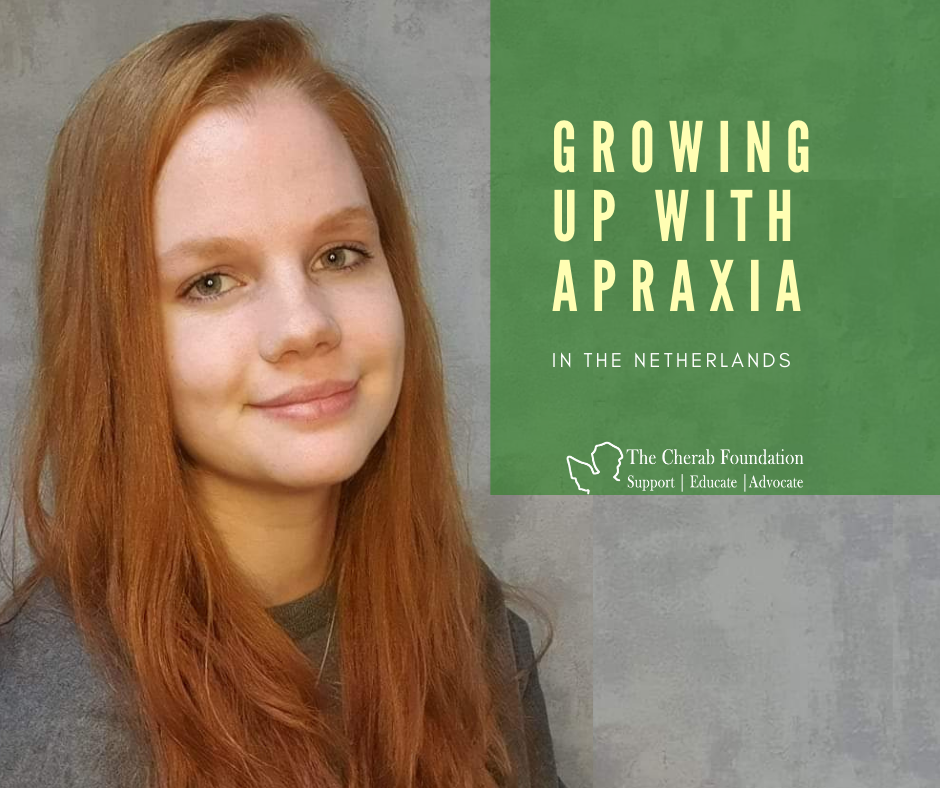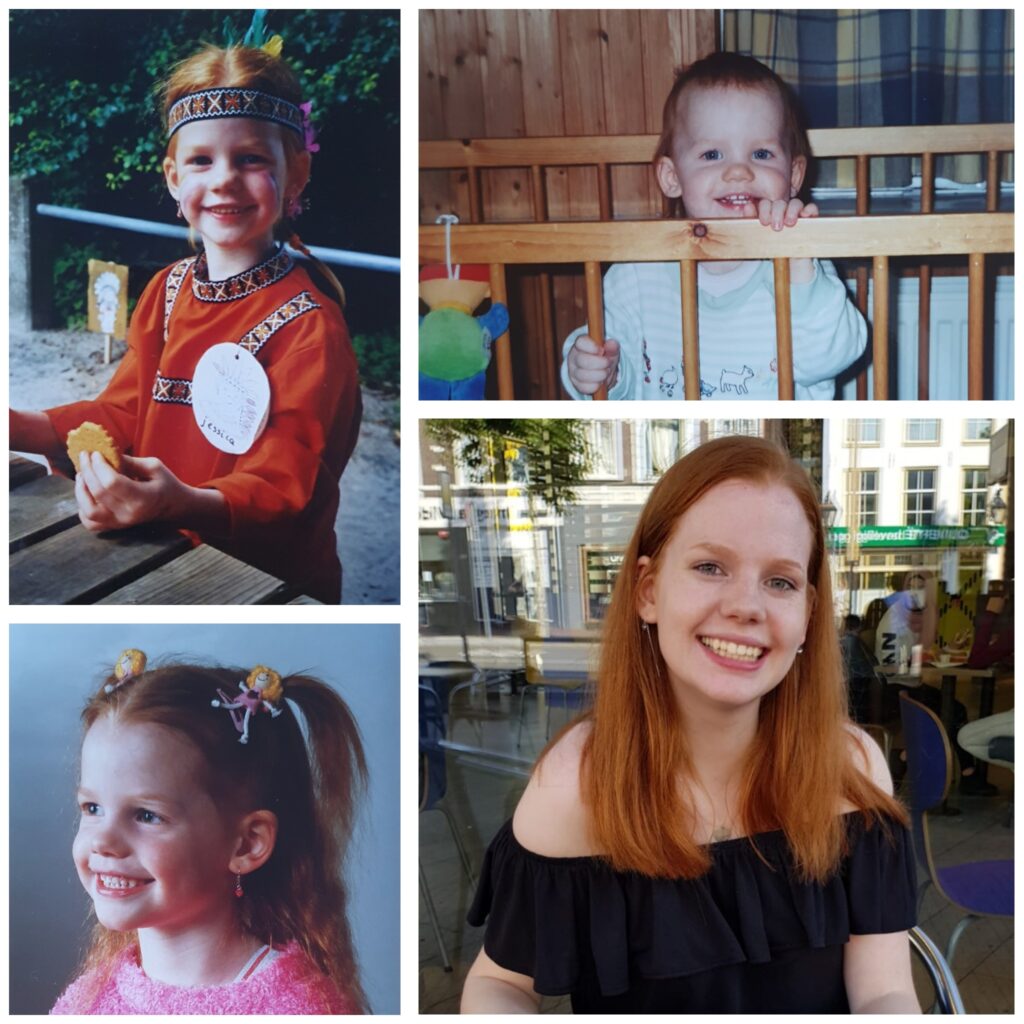I share my story to create more awareness. In the Netherlands, there are still many parents whose children have been diagnosed, but do not know what the future will bring.
Jessica Huttinga, 21 years old, grew up with apraxia since preschool

Hello everyone,
My name is Jessica Huttinga, I am 21 years old and I live in the Netherlands. I have been diagnosed with verbal developmental dyspraxia, which most refer to today as apraxia, since preschool. Verbal developmental dyspraxia is what this diagnosis is called here in the Netherlands. In this post, I will tell you more about my experience.
How I Speak Today
Back in the days
At the age of 2, I only spoke 10 words. On average you can easily speak 200 words at that age. I only communicated with those 10 words and many were abbreviated or made up. My mother also reported this to the consultation bureau at the time, but they said that it will come later. According to the consultation bureau, I wouldn’t talk much there because I was shy, but I didn’t do that at home either. If the consultation bureau had already known more about verbal developmental dyspraxia, then they could have already indicated their suspicion of this. Many consultation bureaus still know nothing about verbal developmental dyspraxia.
Speech therapist
I started speech therapy at the age of 3.5 years. You were actually only allowed to start speech therapy from the age of 4, but since I was so far behind in speech, I was allowed to start earlier. I also had a number of tests in the hospital because it was thought that I was having an epileptic seizure in my sleep, which could explain my language delay. However, the examinations showed that I did not have epilepsy. At the age of 4, I was diagnosed with verbal developmental dyspraxia by the speech therapist. Now the speech therapist here in the Netherlands is no longer allowed to diagnose it, only to suspect. When I got the diagnosis from the speech therapist, it was of course also a hard blow to my mother. My mother immediately looked up the internet to see if she could find anything about it. She could hardly find anything about it, and if, then only in English. My mother also had questions, of course, but even the speech therapist couldn’t answer them all. Nobody knew what the future would bring.
At first, the speech therapist thought I was lagging behind because of my bilingual upbringing. I myself was raised bilingual, with Dutch and German. But after doing a few tests, she knew it wasn’t that.
Back then you didn’t have a name for the different forms of therapy that are available today. In my file, it says that I have had therapy for developmental verbal dyspraxia. Now you have different forms of therapy and terms for that. It is difficult for me to explain exactly what type of therapy I had because it was over 15 years ago and everything is different now. I also know that every country may have different therapies for apraxia.
Speech therapist exercises
I practiced every week at home with assignments from the speech therapist in the notebook. We also played a lot of games, because I always liked that a lot. I also learned a lot through play.
When I was a bit older, I think about 8 years old, we also practiced with a hand mirror and a tape recorder. I got the mirror on the table in front of me and the speech therapist sat behind it. The speech therapist showed a letter with the mouth, and I had to imitate the letters with the help of my hands at my mouth. While I looked in the mirror. So I could see how the letter should be, and I felt in my mouth where to pronounce it. The speech therapist also often recorded me with a tape recorder. That way I could immediately hear what I didn’t pronounce properly and where there was still an improvement. I never liked recording that much. I always tried my best to speak as best I could, and the recording showed that there was still an improvement. Of course, it was good because that way I heard how my pronunciation was, and also whether I was well understood.
Early memory
My earliest memory of starting to notice that I was different from others is that we often went to a fair as a family. I wanted some and asked my mother if she could ask how much it costs. She then told me to go and ask myself. I did that myself, but of course, nobody understood me.
My mother always repeated that. That’s how I also learned to talk to strangers, and I also found it less scary.

School
At the age of 4, like any schoolchild, I went to regular education. But soon the teachers noticed that I was still too far behind in speech than the other children. I got along with the children, but I couldn’t communicate with the teachers. At the end of group 1, my mother was invited by the teacher for an interview. In consultation with my mother, it was decided that it would be better for me to go to speech therapy school. I went there with great pleasure for 3 years. Every child had something and that’s what I liked about it. I have always enjoyed going there. After 3 years I, unfortunately, had to go back to regular education, because I was too good. Something my mother never expected. From then on I went to regular education.
I was about 10 years old when the bullying started. Classmates noticed that I was different
from others and that made me an easy victim. In the beginning, they didn’t want to work with me in class anymore because they thought I was too stupid. After that, they didn’t want to play with me anymore. When I started following a secondary vocational education I was very interesting the first few weeks because I had something that others didn’t. But there too they started to ignore me and stop talking to me. Even the teachers skipped me and I didn’t get a turn. They didn’t know how to deal with me. I personally didn’t like that time. It’s not fair to be bullied for something you can’t do anything about. Then you also start to doubt yourself, which is also logical. Unfortunately, because I was bullied most of the school time, I don’t have any friends. Sometimes that is really hard, but it is the reality.
When I was 9 I got a cat, his name is Minca. I really liked that myself and it is still my cat. Someone who just loves you and accepts you for who you are, what more could you want. He has comforted me in many difficult moments.
The first characteristics
In retrospect, there were some striking features. So I was very quiet in the playpen and I didn’t babble. I only made noise when I was hungry or when I was full. I was also very late sitting, crawling, and walking. At the age of 4, I was still cycling with support wheels because keeping my balance was very difficult for me. I also found catching and throwing a ball very difficult. I couldn’t play badminton at all. Swimming lessons also took a very long time for me.
Now
Looking back now, the best thing that has helped me is speech therapy school and speech therapy. I had the right guidance there and learned a lot.
Apraxia taught me to be really realistic. Not to dream, but to really see what can be achieved with apraxia. Back in school, it seemed like I had a lot of options, such as choosing education and eventually a profession. Now later it turns out that in the end a lot is lost. I have become very realistic about it myself, and I have no goal in life. I always look by day, by week, and where my life is leading me. See what you can and not what you can’t! Has apraxia made me a better person? No, I do not think so. I am who I am and I matter. I can be there too!
What I want to bring
I share my story to create more awareness. In the Netherlands, there are still many parents whose children have been diagnosed but do not know what the future will bring.
The advice I want to give to parents is: have a lot of patience and time. Not everything goes fast, it goes step by step, but every victory is one we are achieving!
Written by Jessica Huttinga, member of the nonprofit Cherab Foundation support group. 21 years old. Jessica grew up with apraxia in the Netherlands.
Thanks for sharing your story .. the future is bright with people like yourself helping others – thanks
Thank you for stepping forward to share . You are so courageous . I enjoyed your self introductory.